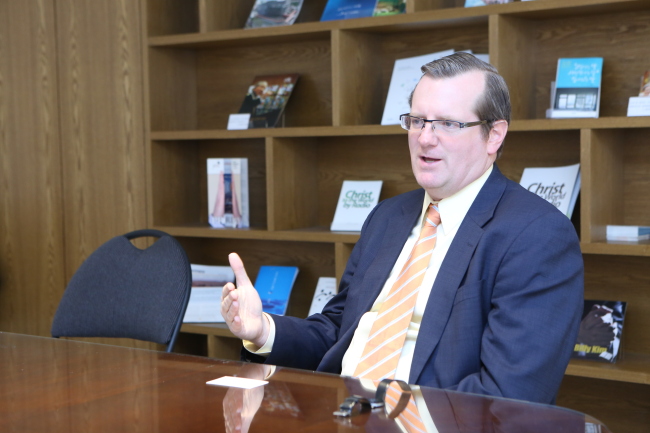In 2012, Wheaton College filed a lawsuit against the U.S. government for requiring institutions to provide emergency contraceptive drugs to their employees. As the college waged its legal battle with the government, criticism arose that the school’s objection was motivated by its desire to criticize the U.S. President Barack Obama’s administration.
But Wheaton College president Philip Graham Ryken said that far from taking a partisan stance, the school was just protecting itself from what it felt was an “overreach of government in this particular area.”
The former pastor spoke strongly against the government’s attempts to intervene in the operations of higher education institutes, saying that its moral principles were under threat.
“Our biggest objection was that the government was going to use its coercive power to require us to provide abortion-inducing drugs to our faculty and staff, which is against the principles of our community covenant,” Ryken, who leads one of the highest-ranked Christian liberal arts colleges in the U.S., told The Korea Herald.

Philip Graham Ryken, president of Wheaton College. (Far East Broadcasting Co.)
Government intervention in tertiary education institutes has been an issue in Korea as well. In August, the government will evaluate all public and private colleges and universities and rank them into five groups.
All except those in the top group will be forced to cut the number of new students they can accept, and those that rank in the bottom for two straight years will be shut down. The lowest-ranked colleges will also receive disadvantages when applying for state-provided scholarship programs.
During his visit to Korea, Ryken has met with heads of universities and said he was shocked by the degree of government influence on higher education institutes.
“I am surprised to learn that government oversight and even intrusion into the governance of higher education is more extensive in Korea than it is in the U.S,” he said. He added that some of the restraints the government placed on schools were “completely foreign to the American approach to higher education,” which allows a much higher level of autonomy.
In the U.S., college evaluations are done via private companies, and have considerably smaller ramifications, he mentioned.
While Ryken emphasized the importance of college autonomy, he reiterated that Wheaton’s rejection of the controversial mandate was not a political stance. As an educational institute, the greatest contribution Wheaton can make to the society is through education, he added.
One of the ways the school does that is through its liberal arts program. He said that although the U.S. mainstream is moving against liberal arts and toward something that is more professionally focused, Wheaton continues to regard it as the best preparation for leadership.
“Most Americans at least will go through several job changes over the course of their professional career. But it is very hard to predict at age 18 the full range of skills you’ll need over the course of a lifetime,” he said.
Employers value the kinds of skills that are taught though liberal arts education, he said, including “written and oral communication, critical and creative thinking (and) the ability to make connections between one area and other areas.”
Wheaton’s program also focuses on character education. According to Ryken, the school helps students develop their people skills, not through any particular program, but through a sense of community that is built around religion. Wheaton is one of the few colleges in the U.S. that only accepts Christian applicants.
Though Ryken emphasized the importance of being politically impartial, he said he encourages his faculty members to speak freely about their areas of expertise. “To that extent, I think schools like Wheaton do influence public opinion,” Ryken said.
The college’s support of Obama’s controversial immigration reform is one of the ways it is taking a stand on contentious issues. As some of the college’s applicants are undocumented residents, Ryken said the school cannot be indifferent about their welfare.
“I think there is a place for university presidents to make wise and thoughtful comments about great issues of our day,” he said.
Wheaton’s involvement in important social issues dates back to its earliest days. It was recently discovered that during the U.S. Civil War, the school had been a stop on the Underground Railroad, a network of secret routes and safe houses used to sneak slaves of African descent to their freedom in the 19th century.
But while Ryken said he admired Jonathan Blanchard’s resolve, he added a different kind of leadership for an educational institute is called for today.
“I think our main role as a college is to produce graduates who know what to do about the great problems of the world. We do that most effectively not by telling college students what to think, but by guiding them in their engagements with world issues,” he said.
By Yoon Min-sik (minsikyoon@heraldcorp.com)



![[Herald Interview] 'Amid aging population, Korea to invite more young professionals from overseas'](http://res.heraldm.com/phpwas/restmb_idxmake.php?idx=645&simg=/content/image/2024/04/24/20240424050844_0.jpg&u=20240424200058)


